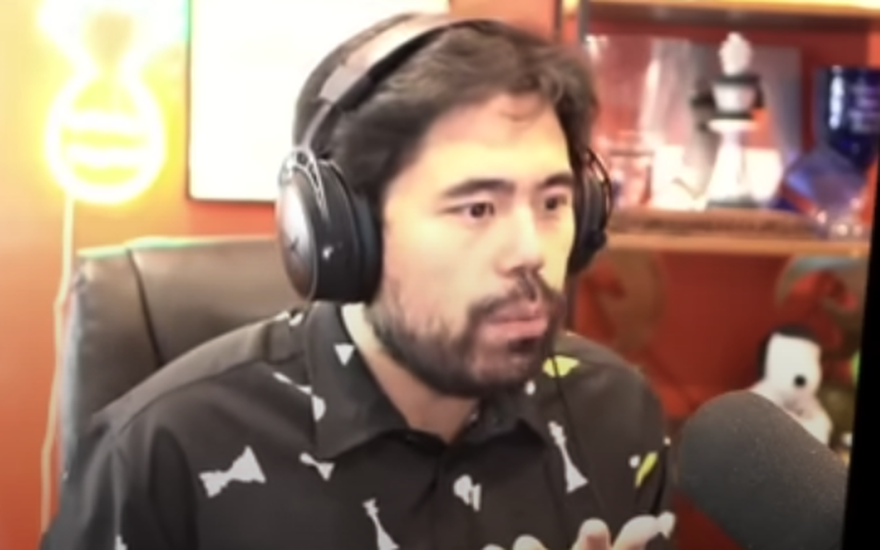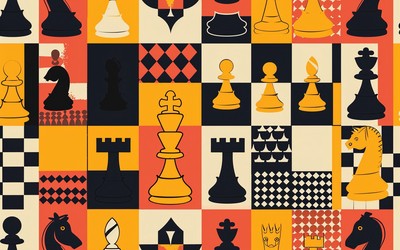
Hikaru Nakamura YouTube
Beating Hikaru
I won the game of my life. Then I was selected for fair play screening.It’s true, I started it all. It was 1999 at the National Junior High Championship. I was playing Hikaru in the fourth round and we were both on 3/3. He got a positional advantage by using a pawn on a5 to freeze two of my pawns on a6 and b7. I still remember his satisfaction as he pushed the pawn. But I fought back and reached an endgame with a bishop against a knight and pawn. My bishop controlled the square in front of his pawn, so if he ever pushed it, I would take the pawn and leave him without enough material to checkmate. An easy draw.
Or so I thought, but he continued to play on. The tournament hall, which had been filled with kids, was now empty except for us and a few tournament directors. Completely forgetting about the 50-move rule, I quickly bashed out my moves... and blundered my bishop. Not even a fork, just moved it where his knight could take it. There was nothing left to do but resign.
The rest is history. Hikaru became one of the top players in the world, then shrewdly switched his focus to streaming at just the right moment. When chess exploded with The Queen’s Gambit and the pandemic, he reaped the rewards. Meanwhile I studied English at Stanford, played poker for years, started working as a data scientist, and only recently got back into chess professionally. If I hadn’t hung that bishop, would it all have been different?
Well, probably not. The will to win Hikaru displayed in that game wasn’t an accident, it’s been his calling card for his whole career, and probably a major driver of his success. I’ve played him several times since, and lost every time. None of the games were as close as the one where I hung the bishop. So when I saw his screen name staring back at me in the second round of Titled Tuesday, I had little reason to expect a different result.
He led with one of his specialty blitz openings, the Reti with e3 and b3. I realized with a groan that I hadn’t prepared for it, even though he had used the exact same opening to beat me before. I reverted to normal developing moves and got a decent position, but spent way too much time on the clock. In my previous games against Hikaru in Titled Tuesday, the game has gone one of two ways: either I blunder and lose quickly, or I play well but can’t keep up on the clock, and lose later when I get low on time. This game seemed headed for the latter, as I maintained a decent position on the board, but surrendered almost a full minute advantage on the clock. But then Hikaru played a sequence of risky moves, putting his bishop on an undefended square on the edge of the board and weakening his king. The key position was when he played f3, forking my bishop and knight.
This is a very dangerous move because it weakens the diagonal to White’s king, but if he can win one of my pieces it will be worth it. He spent eight seconds before making this move, a long time for Hikaru, and evidently decided the coast was clear. To be honest I was so preoccupied with his threats on the queenside that I didn’t even see this fork coming, but once it was on the board, I sensed that White’s position was loose enough that I ought to have a good move. Initially I wanted to sacrifice a knight with Nxg3, but couldn’t make it work. But I also understood that I should combine threats to the two weaknesses in White’s position, the pawn on e3 and bishop on a5, which led me to the correct move, Qg5.
Suddenly I was back in the game, as White doesn’t have a good way to save the bishop and guard e3. Hikaru let me take the bishop on a5. When I watched the stream replay, it turned out he hadn’t noticed it was attacked at all, an odd echo of the bishop blunder I made so many years before. I got a great position with equal material, but a much better pawn structure.
From this point in the game I played very well. Hikaru is not easy to beat, even with a winning position, but I kept control and never gave him any chances. I won an exchange, then several pawns on the kingside, and he resigned.
The thing about Titled Tuesday is, as long as you keep winning, the games don’t get any easier. I managed to beat another GM in the next round, but lost the next two rounds to two more GMs. In round six I was paired against Salem Saleh, a strong GM with a chess.com blitz rating over 3000. I managed a draw in a game where we both played very well.
It was around this point that I received a message from Chess.com staff: “You have been selected for random fair play screening. Please join this zoom call and turn on your screen share.”
I was aware that fair play screening in Titled Tuesday was a thing, but it had never happened to me, and I had never heard of it happening to anyone I know. Maybe this is naive, but even having written about cheating in chess, it didn’t occur to me in the moment that my wins against strong GMs would put me under suspicion. I was just enjoying the tournament and live tweeting my results. But the message from the Chess.com staff member was a cold shower, as given the circumstances it seemed like a fairly pointed implication of suspicion, and I realized I was in a situation where I had nothing to gain and a whole lot to lose.
Once I joined the Zoom call, I was asked to share my screen, show a 360 view of my playing area, and open my task manager. Some requests even continued as I played my next round against another GM. Thoroughly distracted, I blundered and lost quickly. In the remaining rounds I went two out of three against lower rated players, playing much worse than in the beginning of the tournament. I lost the final round with another silly blunder, but at that point I was just glad for it to be over.
When I watched the replay of my game against Hikaru, I realized just how lucky I was. I played far too slowly on many moves, and weakened my position unnecessarily. Indeed, I played just badly enough to provoke Hikaru to attack me in a risky way, which backfired thanks to a resource I hadn’t seen in advance. But after the turning point with Qg5, I played very well, almost perfectly. Given that I had previously identified converting winning positions as a weakness and consciously worked on it, it felt good to bring home a win against a supremely tricky and resourceful opponent.
Nonetheless, I had little time to celebrate my win, and came away from the tournament far more stressed out than happy. I’ve always looked forward to playing Titled Tuesday and especially having the chance to go up against the big dogs. It seemed like a win-win: if I won, I would get bragging rights; if I lost, I would have a great game I could learn from. But after taking down one of the biggest dogs of all, it felt more like a lose-lose: if I lose as expected, nothing happens; but if I win, I could be suspected of cheating.
The Hans Niemann cheating scandal led to me having a curious sort of 15 minutes of fame. I wrote a popular post that got me invited onto a couple of mainstream media podcasts. I even interviewed for a new position at Chess.com related to fair play (they ultimately told me they decided not to create the position). I’ve thought a lot about cheating in chess, but mostly from the perspective of websites or tournament organizers trying to minimize cheating. Being on the other end, as a player potentially suspected of cheating, gave me another perspective.
The current frenzy of cheating suspicion in chess, along with the inherent variability in human performance and the chess world’s still-shaky understanding of statistics, make for a volatile combination. It seems very unlikely that someone like me could beat Hikaru Nakamura, who just defeated Magnus Carlsen to win the Speed Chess Championship. And yet the 500 point difference in our blitz ratings corresponds to about a 5% expected score for me. That’s what the Elo system does, it predicts an expected score based on rating difference. There’s a big difference between 5% and 0%. That means I would be expected to win about one game in 20 (or two draws). Titled Tuesday is 11 rounds long and there are two events every Tuesday. Hikaru usually plays both, for a total of 22 games. So while it’s of course very unlikely that I would beat Hikaru in any given tournament, in a sense, you’d expect something about this unusual to happen every Tuesday. What would be more surprising, in fact, would be if nothing unusual happened. If we’re going to suspect everyone who has an unusually good game, there’s going to be a lot of suspicion to go around.
Of course, I don’t know if I was selected for screening based on my win against Hikaru, my subsequent games, or if it was indeed completely random. In principle, I don’t have a problem with Chess.com screening my games. Live screening should be part of their security measures for an event like Titled Tuesday, and as someone who played above my head for a few games against prominent players, I was exactly the guy you’d keep an eye on. Still, parts of the process seemed problematic from a competitive perspective. In my case, I don’t play Titled Tuesday with any expectation of winning, and with 3.5/6 I was all but mathematically eliminated from prize contention. (Hikaru came back and won the tournament with 9.5/11!) But being on a video call and responding to requests is a huge distraction. In a situation where the results matter, all players should compete under the same conditions.
Additionally, they would be well served to be more transparent about the anti-cheating measures in place. I’ve never seen any kind of announcement that when you play Titled Tuesday you should be ready to join a video call (maybe it’s in the fine print somewhere). I wonder what they would do if someone said they don’t have Zoom installed. I’ve had lots of people in work situations be unable to connect to Zoom calls for legitimate reasons. Similarly, what are the expectations for the playing area? When I’m playing Titled Tuesday, my desk looks like it usually does: cluttered with notepads, pens, books, sticky notes, etc. I’d bet the playing area for most players in Titled Tuesday looks similar. When I did the 360 view of my room, my phone could be seen charging a few feet away. The Chess.com staff member didn’t say anything, but wouldn’t that be exactly the sort of thing you’d watch out for? Overall, being more upfront about expectations would not only be more fair, it could also serve as a deterrent to potential cheaters.
As aggressive as it was in some ways, the screening would probably not catch a determined cheater. They could rearrange the area after the 360 scan, have someone standing off camera, or avoid detection in any number of other ways. Most of the discussion about cheating in chess has focused on how to improve security measures, but I think we need to consider the possibility that some kinds of tournaments simply cannot be held securely. A large online tournament like Titled Tuesday may be one of these. We might need to draw a distinction between large online tournaments that operate largely on the honor system, and higher stakes tournaments with far smaller player pools that can be held in person, or with much more extensive anti-cheating measures. In any case, I don’t envy the job Chess.com has in running these tournaments fairly. They didn’t create the problem of cheating in chess, but now that they are in charge of so many of the biggest tournaments, it will be up to them to try to solve it.
As for me, with an eight-month-old and various ongoing projects in and out of chess, these days most of my limited chess time is devoted to writing and coaching, not improving my own game. I do sometimes wonder how high I could go if I really committed. At every period in my life where I played tournaments regularly, I’ve been able to increase my rating consistently. If I went all-in could I make the IM or even GM title? The game against Hikaru showed me that on my day I can beat literally anyone, but this experience gives me pause about OTB goals as well. If I did make such a leap at my age it would be quite unusual. Would it be worth making the sacrifices to seriously improve my own game if succeeding might only result in increased scrutiny and stress?
Despite my misgivings, I joined Titled Tuesday again the next week. I had an odd sense that I wanted to do well, but perhaps not too well, a feeling I’ve never before had going into a chess tournament. As luck would have it, I was paired against former world champion Vladimir Kramnik. What if I beat Hikaru and Kramnik on back-to-back Tuesdays? I was already writing the tweet in my head. But it wasn’t to be: Kramnik dismantled me in a style befitting a world champion. I wished I had taken the chance to put up a better fight, but another part of me was relieved.
If you liked this check out my newsletter where I write weekly posts about chess, learning, and data: https://zwischenzug.substack.com/




